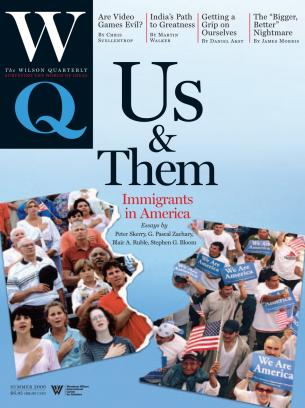Us & Them: Immigrants in America


Professor Aare trumps Dr. Zimmer in the Nobel Prize competition.
Despite growing demand for genetic testing, the government has yet establish firm oversight guidelines.
Does media coverage of suicides lead others to take their own lives? Among certain age groups, the answer is yes.
With so much attention focussed these days on the political influence of the Religious Right, it may be hard to remember that its plunge into politics is a relatively recent phenomenon.
Studies remain inclusive about whether the death penalty lowers the homicide rate.
Latin American politics has come to be divided into two Lefts. How they deal with each other will determine the region's future.
Cuba's interventions in Angola and Ethiopia were viewed with alarm in America and disapproval in Moscow, but Castro seems to have acted on his own, and perhaps even effected some positive change.
Consumer demands for protection against computer virus and worm attacks threaten to quash the Internet as it now exists.
"Virtual" investments and globalization are just a few of the contemporary wrinkles causing a reconsideration of the concept of property.
Certain forms of dance are in danger of vanishing because their intricacies are known only to a select few.
Partisanship has migrated from the nation's capital to the state capitals, and many Americans say they are sick of it.
It's long been known that FHA policies discriminated against black homebuyers. Now comes the news that private lenders followed the same flawed guidelines.
Some critics have questioned the authenticity of certain Rembrandt paintings because of their theatricality, but, according to Robert Hughes, drama defines the painter's style.
The U.S.-led invasion of Iraq coupled with the European Union's footdragging on membership have strained relations with Turkey, a vitally strategic partner in the troubled Middle East.
What we don't know can hurt us, at least according to the security experts.
The high price of crude oil is also exacting a price on democracy in petroleum-producing nations.
Today's interned Taliban and Al Qaeda suspects remind some of the treatment of jailed British fascist Sir Oswald Mosley.
Global warming appears to be opening up an Arctic sea route to the Pacific, but the U.S. Navy is unprepared to navigate it.
Common Sense the nation's first best-seller? Another myth shot down.
In the global warming debate, both sides are right: the Kyoto treaty has flaws, but greenhouse emissions are real, and causing verifiable effects. One longtime observer believes it's time to do something about them.
Americans are tolerant of most religious groups, but that openness does not extend to atheists.
Angkor was once the seat of a powerful Khmer kingdom of several thousand, which ruled Southeast Asia from the ninth to 15th centuries. What destroyed it?
How a nation's citizens view their country's founding myths may be a telling barometer of cultural health.
A close look at quotations reveals a maze of misattribution, error, and outright invention.
Max Byrd on the Battle of New Orleans
Florence King on not-so-good cheer
Peter Schwartz on brain science
J. Peter Pham on America's muddled mission in Africa
Sanford Lakoff on political thinker Richard Hofstadter
Max Holland on presidential commissions
Ann Loftin on art critic Clement Greenberg
Albert Innaurato on the man behind the Met
Roxana Robinson on Anne Barclay Priest, actress and sheep herder
Lawrence Rosen on Morocco
Amy E. Schwartz on faith and evolution
Martin Walker on France's modern history
David Lindley on the hinterlands of algebra
Nick Gillespie on magazine editor Willie Morris
The Statue of Liberty stood for decades in New Yorkharbor before it became a symbol of welcome tonewcomers. In forgetting that fact, Americans reveal their taste for myths about immigration.
A growing number of Africans are arriving in the United States in search of a better life. But even as these immigrants learn to negotiate a complex new culture, they cannot forget the beloved and blighted lands that sent them forth, yet call them back.
The disruption that immigrants bring is often a benefit.
Rural America is hemorrhaging its nativepopulation, clearing the way for newcomerswho see in its wide open spaces and plentiful menial jobs a land of opportunity. Andsmall-town life is changing forever.
Violent video games teach our kids to point and shoot, say their critics. The truth may be every bit as frightening to members of a generation raised to believe they’re thinking outside the box.
After decades of dormancy, India has blossomed into one of Asia’s two emerging powers and an important strategic partner of the United States. How—and whether—it navigates its rise could well determine the future of the whole region.
The 20th century taught us that repressed desires are the source of human unhappiness. Now, with more possibilities for pleasure and fewer rules and constraints than ever before, the happy few will be those able to exercise self-control.
Novelty beckons Americans as never before. As the wreckage of our headlong race for the next new thing recedes in the rearview mirror, will we remember what we’ve lost?